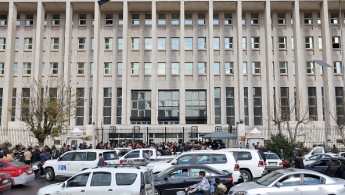Breadcrumb
Who is Maysaa Sabrine, the first woman to head Syria's central bank?
Syria’s new administration announced Maysaa Sabrine's appointment as the governor of the Central Bank of Syria, marking a historic moment as she becomes the first woman to hold this position.
Sabrine holds a master's degree in accounting from Damascus University and is a certified public accountant.
She has been a member of the board of directors at the Damascus Securities Exchange since December 2018, representing the central bank.
Sabrine has also served as the deputy governor of the central bank and led the Office Control Division.
Sabrine succeeds Mohammed Issam Hazime, who held the position since 2021.
Hazime continued his tenure after being appointed by then-President Bashar al-Assad but was replaced following Assad’s overthrow by a lightning rebel offensive, led by Hayat Tahrir al-Sham (HTS), on 8 December.
Economic liberalisation efforts
Under the new administration, the Central Bank has shifted towards economic liberalisation, removing pre-approvals for imports and exports and easing foreign currency controls.
However, Syria and its banking system remain under significant Western sanctions.
Following Assad’s fall, the bank assessed its assets amidst reports of looting. The main vaults remained intact, retaining nearly 26 tonnes of gold.
However, foreign currency reserves have plummeted from $18 billion in 2011 to an estimated $200 million.
Leadership and representation
Sabrine is the second woman appointed to a key role by the new Syrian administration, following Aisha al-Dibs, who was named head of the Women’s Affairs Office under the interim government led by Ahmad al-Sharaa.
Despite these appointments, concerns persist among Syrians about the potential marginalisation of minorities and women under the new administration.
Recent comments by al-Dibs about the role of feminist organisations have sparked public outrage, with many fearing that the new government may adopt policies that limit women’s participation in public life.
In response, Syria’s newly appointed Foreign Minister Assaad al-Shibani stated on social media platform X that his government would "stand by" women and "fully support their rights".
"We believe in the active role of women within society, and we have confidence in their capacities," he said.
"Syrian women fought long years for a free homeland that preserves their dignity and status."






![Anthony Blinken speech [Getty] Anthony Blinken speech [Getty]](/sites/default/files/styles/image_684x385/public/media/images/6263436E-8ACD-4D3C-9055-25A7BE79DD5A.jpg?h=d1cb525d&itok=fLHmHCRG)
 Follow the Middle East's top stories in English at The New Arab on Google News
Follow the Middle East's top stories in English at The New Arab on Google News
![Hajj Saudi Arabia [Getty]](/sites/default/files/styles/image_330x185/public/2157179630.jpeg?h=a5f2f23a&itok=kuo1G9Hw)
![French President Macron [Getty]](/sites/default/files/styles/image_330x185/public/2192150629.jpeg?h=a5f2f23a&itok=_lRlOebg)
![Gaza death toll [Getty]](/sites/default/files/styles/image_330x185/public/2192491071.jpeg?h=a5f2f23a&itok=1V9vL9X5)